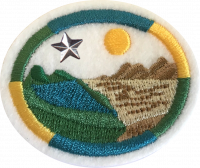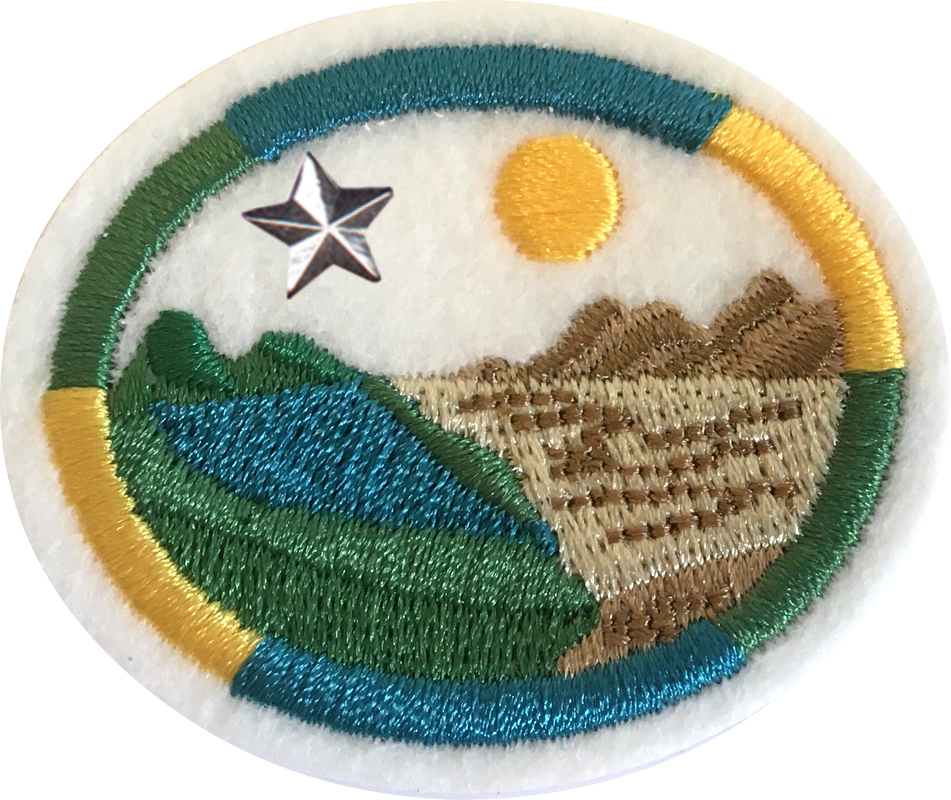Difference between revisions of "AY Honors/Climate Science - Advanced/Requirements"
Jomegat bot (talk | contribs) m (Jomegat bot moved page AY Honor Climate Science - Advanced Requirements to AY Honor Climate Science - Advanced Requirements: Bot: Moved page) |
m (- Category of Honor Requirements) |
||
| (7 intermediate revisions by 2 users not shown) | |||
| Line 1: | Line 1: | ||
| − | + | {{HonorSubpage}} | |
| − | |||
| − | |||
| − | + | <section begin=Body /> | |
| − | |||
| − | <b> | + | <b>1. <section begin=req1 /><noinclude><translate><!--T:1--> |
| − | <section end= | + | </noinclude>Earn the [[AY Honors/Climate Science|Climate Science]] Honor, and at least one of the following honors:<br> [[AY Honors/Alternative Fuels|Alternative Fuels]]<br> [[AY Honors/Ecology|Ecology]]<br> [[AY Honors/Environmental Conservation|Environmental Conservation]]<br> [[AY Honors/Recycling|Recycling]]<br> [[AY Honors/Renewable Energy|Renewable Energy]]<br> [[AY Honors/Rivers and Streams|Rivers and Streams]]<br> [[AY Honors/Weather|Weather]] |
| + | <noinclude></translate></noinclude><section end=req1 /></b> | ||
| − | <b> | + | <b>2. <section begin=req2 /><noinclude><translate><!--T:2--> |
| − | <section end= | + | </noinclude>What is industrialized agriculture? What are some positive and negative impacts that industrialized agriculture has had on earth’s climate? How have industrialized agriculture methods changed over the past 200 years? |
| + | <noinclude></translate></noinclude><section end=req2 /></b> | ||
| − | <b> | + | <b>3. <section begin=req3 /><noinclude><translate><!--T:3--> |
| − | <section end= | + | </noinclude>Name at least two government agencies in your country and three non-government organizations (e.g. UN, IPCC) that provide research associated with climate change for the purposes of influencing government policy. Review a report published by each of these five entities and discuss the similarities and differences of their evidence and conclusions. |
| + | <noinclude></translate></noinclude><section end=req3 /></b> | ||
| − | + | <b>4. <section begin=req4 /><noinclude><translate><!--T:4--> | |
| − | <section end= | + | </noinclude>Research a climate change topic that may be controversial. |
| + | <noinclude></translate></noinclude><section end=req4 /></b> | ||
| − | :<b> | + | :<b>a. <section begin=req4a /><noinclude><translate><!--T:5--> |
| − | <section end= | + | </noinclude>Identify a source from each side of the controversy that utilizes scientific evidence to support the authors’ conclusions. |
| + | <noinclude></translate></noinclude><section end=req4a /></b> | ||
| − | :<b> | + | :<b>b. <section begin=req4b /><noinclude><translate><!--T:6--> |
| − | <section end= | + | </noinclude>Outline each argument providing the hypothesis, evidence, and conclusion for each side. |
| + | <noinclude></translate></noinclude><section end=req4b /></b> | ||
| − | :<b> | + | :<b>c. <section begin=req4c /><noinclude><translate><!--T:7--> |
| − | <section end= | + | </noinclude>Examine your outlines to determine if your own personal biases affected your outlines. |
| + | <noinclude></translate></noinclude><section end=req4c /></b> | ||
| − | <b> | + | :<b>d. <section begin=req4d /><noinclude><translate><!--T:8--> |
| − | <section end= | + | </noinclude>Answer the following question: Can a person examine scientific evidence without allowing their personal biases to affect their examination? |
| + | <noinclude></translate></noinclude><section end=req4d /></b> | ||
| − | <b> | + | <b>5. <section begin=req5 /><noinclude><translate><!--T:9--> |
| − | <section end= | + | </noinclude>What is permafrost? How does the Earth’s climate affect permafrost? Why is it important for scientists to monitor permafrost? |
| + | <noinclude></translate></noinclude><section end=req5 /></b> | ||
| − | <b> | + | <b>6. <section begin=req6 /><noinclude><translate><!--T:10--> |
| − | <section end= | + | </noinclude>Research your state/provincial government’s efforts to address the effects of greenhouse gases. Be prepared to discuss your findings with a group. |
| + | <noinclude></translate></noinclude><section end=req6 /></b> | ||
| − | + | <b>7. <section begin=req7 /><noinclude><translate><!--T:11--> | |
| − | <section end= | + | </noinclude>Renewable energy has been postulated as a solution for reducing greenhouse gases. Do three of the following: |
| + | <noinclude></translate></noinclude><section end=req7 /></b> | ||
| − | :<b> | + | :<b>a. <section begin=req7a /><noinclude><translate><!--T:12--> |
| − | <section end= | + | </noinclude>Illustrate through creative media the process of how greenhouse gases are theorized to effect change to our climate. |
| + | <noinclude></translate></noinclude><section end=req7a /></b> | ||
| − | :<b> | + | :<b>b. <section begin=req7b /><noinclude><translate><!--T:13--> |
| − | <section end= | + | </noinclude>Research what efforts your local state/provincial government is taking to promote the adoption of renewable energy sources. |
| + | <noinclude></translate></noinclude><section end=req7b /></b> | ||
| − | :<b> | + | :<b>c. <section begin=req7c /><noinclude><translate><!--T:14--> |
| − | <section end= | + | </noinclude>List ways you and your family can adopt renewable energy or reduce your energy footprint. |
| + | <noinclude></translate></noinclude><section end=req7c /></b> | ||
| − | :<b> | + | :<b>d. <section begin=req7d /><noinclude><translate><!--T:15--> |
| − | <section end= | + | </noinclude>Where possible, invite a local expert to come speak to your group about climate change and renewable energy. |
| + | <noinclude></translate></noinclude><section end=req7d /></b> | ||
| − | <b> | + | :<b>e. <section begin=req7e /><noinclude><translate><!--T:16--> |
| − | < | + | </noinclude>Find and review online resources, videos, news reports, and similar media and share them with your group. |
| + | <noinclude></translate></noinclude><section end=req7e /></b> | ||
| − | + | <section begin=challenge /> | |
| − | <section end= | + | <b>8. <section begin=req8 /><noinclude><translate><!--T:17--> |
| + | </noinclude>Individually or as a group, complete one of the following: | ||
| + | <noinclude></translate></noinclude><section end=req8 /></b> | ||
| − | :<b> | + | :<b>a. <section begin=req8a /><noinclude><translate><!--T:18--> |
| − | <section end= | + | </noinclude>Create a model of a water harvesting system. Prepare and give an oral presentation to a group, presenting your model, its effectiveness, and the local laws concerning gathering rain water. |
| + | <noinclude></translate></noinclude><section end=req8a /></b> | ||
| − | + | :<b>b. <section begin=req8b /><noinclude><translate><!--T:19--> | |
| − | + | </noinclude>Visit a park, museum, science center, or other facility that employs eco-conscious practices. Take a tour, talk to an employee, or in some other way learn about and evaluate the features you see. | |
| + | <noinclude></translate></noinclude><section end=req8b /></b> | ||
| + | <section end=challenge /> | ||
| + | <section end=Body /> | ||
Latest revision as of 21:27, 20 July 2022
Skill Level
3
Year
2019
Version
05.02.2026
Approval authority
North American Division
1. Earn the Climate Science Honor, and at least one of the following honors:
Alternative Fuels
Ecology
Environmental Conservation
Recycling
Renewable Energy
Rivers and Streams
Weather
2. What is industrialized agriculture? What are some positive and negative impacts that industrialized agriculture has had on earth’s climate? How have industrialized agriculture methods changed over the past 200 years?
3. Name at least two government agencies in your country and three non-government organizations (e.g. UN, IPCC) that provide research associated with climate change for the purposes of influencing government policy. Review a report published by each of these five entities and discuss the similarities and differences of their evidence and conclusions.
4. Research a climate change topic that may be controversial.
- a. Identify a source from each side of the controversy that utilizes scientific evidence to support the authors’ conclusions.
- b. Outline each argument providing the hypothesis, evidence, and conclusion for each side.
- c. Examine your outlines to determine if your own personal biases affected your outlines.
- d. Answer the following question: Can a person examine scientific evidence without allowing their personal biases to affect their examination?
5. What is permafrost? How does the Earth’s climate affect permafrost? Why is it important for scientists to monitor permafrost?
6. Research your state/provincial government’s efforts to address the effects of greenhouse gases. Be prepared to discuss your findings with a group.
7. Renewable energy has been postulated as a solution for reducing greenhouse gases. Do three of the following:
- a. Illustrate through creative media the process of how greenhouse gases are theorized to effect change to our climate.
- b. Research what efforts your local state/provincial government is taking to promote the adoption of renewable energy sources.
- c. List ways you and your family can adopt renewable energy or reduce your energy footprint.
- d. Where possible, invite a local expert to come speak to your group about climate change and renewable energy.
- e. Find and review online resources, videos, news reports, and similar media and share them with your group.
8. Individually or as a group, complete one of the following:
- a. Create a model of a water harvesting system. Prepare and give an oral presentation to a group, presenting your model, its effectiveness, and the local laws concerning gathering rain water.
- b. Visit a park, museum, science center, or other facility that employs eco-conscious practices. Take a tour, talk to an employee, or in some other way learn about and evaluate the features you see.


